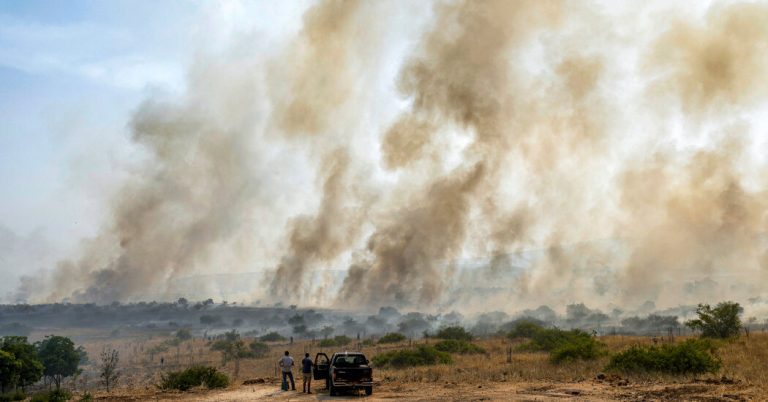Hezbollah responded Thursday to Israeli airstrikes in Lebanon with a second straight day of sharp rocket and drone attacks on Israel, in an intensifying conflict that has raised fears of all-out war.
How many weapons Hezbollah fired Thursday was unclear, but the group’s Al-Manar radio station reported that at one point, more than 100 were fired in a simultaneous, coordinated attack targeting several Israeli military installations. This included a series of drone strikes targeting Israel’s northern military headquarters, Hezbollah said.
The Israeli military said in the afternoon that Hezbollah had fired more than 40 rockets across the border, but the barrage continued into the evening. Hours later, the military had not updated that number, but a military spokesman called it the most serious attack since the war between Israel and Hamas began in October. He did not immediately provide further details.
At least four people were wounded in Thursday’s attack, according to Israel’s military and emergency agency, Magen David Adom. The military said in the afternoon that its air defenses had shot down many of the weapons fired up to that point, but some had penetrated. The attacks and counter-attacks lit fires on both sides of the border.
On Thursday night, Lebanon’s state news agency reported that an Israeli strike destroyed a house, caused several casualties and a fire in the Lebanese town of Janata, a few miles from the coastal city of Tyre.
On Tuesday, an Israeli strike targeted and killed Taleb Abdullah, one of the senior commanders of Hezbollah, a powerful Iranian-backed armed group and political faction. The group vowed to step up its attacks on Israel in retaliation.
On Wednesday, Hezbollah fired more than 200 rockets at Israel, according to the Israeli military, but they caused little damage.
The Israeli military said on Thursday that its warplanes struck “Hezbollah military structures” overnight in Lebanese border villages.
After the Hamas-led attack on Israel on October 7 and Israel’s retaliatory campaign in the Gaza Strip, Hezbollah stepped up its attacks against Israel, which responded with artillery and airstrikes in Lebanon, bringing to a boil a long-standing conflict.
The near-daily strikes have forced more than 150,000 Israelis and Lebanese living near the border to flee their homes.
Israeli officials have threatened stronger action against Hezbollah, and pressure to do so — from the political right and displaced civilians — has grown. But so far both sides have stopped well short of an all-out war.
Israel killed Mr Abdullah in an attack on Tuesday night in Juaya, southern Lebanon, saying he “planned, promoted and carried out a large number of terrorist attacks against Israeli civilians”.
The United States, France and other mediators, warning of the risk of a regional war, have tried to broker a diplomatic settlement between Israel and Hezbollah that could restore calm on both sides of the border. But analysts say the likelihood of a deal is low as Israel’s eight-month campaign in Gaza continues.
Israel invaded Lebanon in 1978, 1982 and 2006, each time to repel militant groups that were launching attacks on Israel.
Jonathan Rice contributed to the report.




